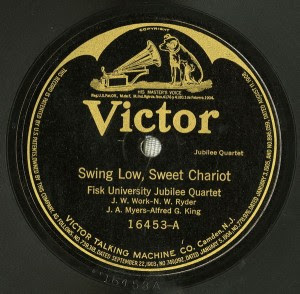What was the first million-selling gospel single? The answer is not straightforward.
Many sources say that it was "Sorry I Never Knew You" by the Sego Brothers and Naomi, which reached #50 on the Billboard country chart in 1964.
 |
| Billboard, August 4, 1979 |
That is a remarkably low chart peak for a record that supposedly sold a million copies, but its weak chart performance doesn't necessarily rule out the possibility that it was a big seller. Some bestselling records didn't chart at all or were under-ranked on the charts, such as albums that were sold through nontraditional channels (like television commercials) and albums that sold steadily over a long period of time without having the kind of sales spurt that would put them on a bestsellers chart (like Jim Nabors' albums).
In the clipping pictured above, Billboard itself repeated the claim that "Sorry I Never Knew You" was "the first million-selling gospel disk" but softened the claim by adding that it "is said to be the first."
Billboard might equivocate in this matter, but many books don't—some say straight-up that the Sego Brothers and Naomi's record is the first gospel million seller. One example is the 1979 Gospel Music Encyclopedia by Anderson and North.
I became suspicious of this claim after mentioning it to Bill Buster, who has operated both American Record Sales, Inc., and Eric Records since the 1960s and knows a lot about hit singles. He said that he has never sold a single copy of "Sorry I Never Knew You." That seemed odd.
After looking into it more, it turns out that Billboard and I were right to doubt this bit of gospel music trivia. The first gospel single to reportedly sell a million copies was released more than a half century earlier. It was the Fisk Jubilee Singers' "Swing Low, Sweet Chariot" in 1909, according to Bil Carpenter's 2005 book Uncloudy Days: The Gospel Music Encyclopedia.
If you insist that we consider only certified million sellers, then "Sorry I Never Knew You" is still not the first gospel record on the list. The first certified million seller is the Carter Family's "Can the Circle Be Unbroken (Bye and Bye)," originally released in 1935.
 |
| The Carter Family |
It's worth mentioning here that many million-selling records were never officially certified as million sellers by the Recording Industry Association of America (RIAA), either because the records were released by independent labels that didn't (or couldn't) keep track of their sales, or because the records' peak sales occurred before the RIAA existed. Nevertheless, many records' status as million sellers is widely accepted despite the lack of certification.
Here is a chronological list, up to 1965, of the earliest million-selling gospel singles, which I extracted from Carpenter's book. The ones that are followed by an asterisk are not certified by the RIAA.
You'll notice that the Sego Brothers and Naomi are not on the list at all. What's up with that?
Million-selling gospel singles through 1965
1909 – Fisk University Jubilee Quartet, AKA Fisk Jubilee Singers – "Swing Low, Sweet Chariot"*
1935 – The Carter Family – "Can the Circle Be Unbroken (Bye and Bye)"
1937 – Marian Anderson – "Ave Maria"*
1938 – Louis Armstrong – "When the Saints Go Marching In"
1945 – Sister Rosetta Tharpe – "Strange Things Happening Every Day"
1947 – Fairfield Four – "Don't Let Nobody Turn You Around"*
1948 – The Chuckwagon Gang – "I'll Fly Away"
1948 – Mahalia Jackson – "Move on Up a Little Higher"*
1955 – Clara Ward Singers – "Surely, God Is Able"*
1957 – Clara Ward Singers – "Packing Up"*
1957 – Staple Singers – "Uncloudy Day"
1965 – The Impressions – "People Get Ready"
*Not certified by the RIAA.









